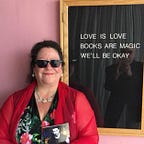Do You Need Pandemic Marriage Therapy?
--
Don’t let the COVID crisis bring your marriage down.
Feeling cooped up? Spending too much time together? Bickering or arguing a lot? Have you been feeling lately that you and your mate have become broken records when it comes to the same old fight? Or maybe you are emotionally distant from one another, or struggling through a recent crisis or loss. When something does not feel right, that’s where couples therapy, also known as marriage therapy and conjoint therapy, may help.
While some people use couples therapy to make a good relationship even better, most end up seeking help when they’ve hit a roadblock and their problems seem to outstrip their skills at handling them, according to Licensed Marriage and Family Therapist Winifred Reilly, LMFT.
“Effective marriage therapy will help people make sense of what’s gotten them stuck and offer tools and encouragement to help them grow,” she says.
Here’s what you need to know to help decide if couples therapy is right for you.
- How it differs from individual therapy. Couples therapy brings both of you, and your problems, into the room together. “Marital therapy is focused on the relationship between two people — enhancing, improving, problem-solving, and dealing with conflict,” says psychotherapist Toni Coleman, LCSW, CMC. “The goals for this therapy are very specific to the relationship itself as opposed to individual therapy which focuses on only the individual and their issues and needs.”
- When to consider marriage therapy. It can help if you are stuck in the same negative pattern every day. “People in relationship should seek counseling if they find that there is a high degree of distress, difficulty [in] communication, general dissatisfaction, or a lack of connection,” says Marni Feuerman, LCSW, LMFT, a couples therapist who also leads Relationship Enhancement Workshops. “Some issues creating problems are often around mistrust, betrayal, infidelity, sexual dissatisfaction, parenting differences, difficulties with in-laws or other extended family members — or for any number of reasons.”
- Reasons some people are reluctant. Couples may delay seeking help because they are fearful. “Many couples don’t know what to expect from couples therapy,” says psychologist Susan Orenstein, PhD. “They’re worried about hearing feedback about themselves that could be painful. They’ve been avoiding these discussions at home and they may be afraid to hear that their partner isn’t happy or is thinking about seeing someone else.”
- How couples therapy can help. Ideally, channels of communication will open and both of you will have a new understanding of each other’s points of view and how to make your relationship better. Reilly says this therapy often helps couples to:
-See the part they each play in their relationship difficulties.
-Craft alternatives to the non-productive patterns they engage in.
— Address personal issues that are getting in their way — ranging from drug or alcohol use to anger outbursts to depression.
— Explore challenges the couple faces around intimacy and in sex.
— Learn to manage their reactivity during high-stress interactions with each other.
— Become more effective communicators and better apologizers and forgivers. - When therapy together is not advised. Conjoint therapy is not always the answer. “For couples counseling to be successful, there has to be a sense of safety and basic respect,” says psychologist Susan Orenstein, PhD. Couples therapy is not advised, she says, if: “one or both partners have been physically abusive, can’t manage their anger, and aren’t open to feedback, or will take what’s said in the counseling sessions and use it against their partner.”
- Who to ask for help. Seek a licensed professional with special training in couple’s therapy. Marriage and Family Therapy is a specific therapeutic field that clinically trains practitioners identified as Marriage and Family Therapists (MFT). The American Association for Marriage and Family Therapy (AAMFT), a related professional organization, says these licensed therapists see about 6.1 million people annually. There are many other psychotherapists who do this work, such as those with a Masters in Social Work (MSW) and Psychologists (known as PhD or PsyD). An LMFT or LMSW means they are licensed in their state.
Ultimately, couples therapy provides a way to work on the issues you cannot seem to tackle on your own and provides a forum in which suppressed feelings and avoided issues can be brought to light.
As Orenstein surmises, “An experienced couple’s therapist will facilitate those conversations, helping you address sensitive issues and helping you ‘find each other,’ reignite your affection, [and your]connection and intimacy.”
Have you thought of trying couples therapy?
